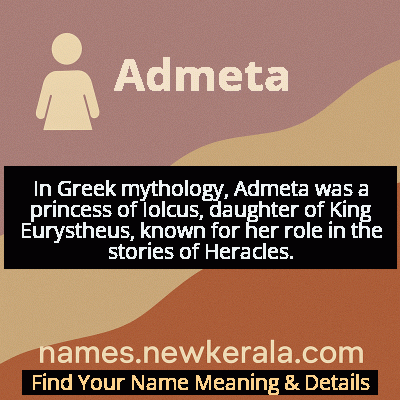Admeta Name Meaning & Details
Origin, Popularity, Numerology Analysis & Name Meaning of Admeta
Discover the origin, meaning, and cultural significance of the name ADMETA. Delve into its historical roots and explore the lasting impact it has had on communities and traditions.
Name
Admeta
Gender
Female
Origin
Greek
Lucky Number
8
Meaning of the Name - Admeta
In Greek mythology, Admeta was a princess of Iolcus, daughter of King Eurystheus, known for her role in the stories of Heracles.
Admeta - Complete Numerology Analysis
Your Numerology Number
Based on Pythagorean Numerology System
Ruling Planet
Saturn
Positive Nature
Ambitious, efficient, realistic, and authoritative.
Negative Traits
Materialistic, stressed, confrontational, and can be overly ambitious.
Lucky Colours
Dark blue, black.
Lucky Days
Saturday.
Lucky Stones
Blue sapphire, amethyst.
Harmony Numbers
2, 4, 6.
Best Suited Professions
Business leaders, managers, financial services, law enforcement.
What People Like About You
Leadership, determination, organizational skills.
Famous People Named Admeta
Admeta of Greek Myth
Mythological Princess
Daughter of King Eurystheus who featured in Hercules' labors
Admeta Papamichael
Modern Greek Scholar
Classical studies researcher specializing in Heraclean myths
Admeta Constantinou
Cultural Historian
Author of 'Forgotten Women of Greek Mythology'
Name Variations & International Equivalents
Click on blue names to explore their detailed meanings. Gray names with will be available soon.
Cultural & Historical Significance
The name Admeta reflects the Greek appreciation for names that carried both personal meaning and narrative function. As a mythological figure, she represents the aristocratic class and the power of royal women to influence events through their requests. Her cultural legacy extends beyond her specific myth, serving as an example of how ancient Greek society acknowledged female agency within structured social hierarchies. The preservation of her story across centuries of mythological retelling indicates her enduring cultural relevance as a symbol of feminine influence in heroic traditions.
Extended Personality Analysis
Those bearing the name Admeta are often characterized by a unique combination of determination and refinement. Drawing from the mythological princess who confidently requested Hercules' assistance, modern Admetas typically exhibit strong willpower coupled with diplomatic grace. They tend to be strategic thinkers who understand how to achieve their goals through persuasion rather than force, reflecting the original Admeta's ability to set a hero on a quest through a simple request. This creates a personality profile of someone who is both ambitious and socially adept, capable of navigating complex situations with intelligence and poise.
Additionally, Admetas often display a natural authority and sense of self-worth that commands respect without being overbearing. They typically possess excellent communication skills and the ability to articulate their desires clearly and effectively. There's often a creative or intellectual bent to their personality, with many showing interest in history, literature, or the arts. The name suggests someone who values tradition but isn't bound by it, combining respect for the past with forward-thinking vision. This results in individuals who are both grounded in their heritage and open to innovation and progress.
Modern Usage & Popularity
In contemporary naming practices, Admeta remains an extraordinarily rare choice, primarily appearing in academic circles, among mythology enthusiasts, or in families with strong Greek cultural connections. The name has never appeared on popular baby name charts in English-speaking countries, maintaining its status as an exclusive and scholarly selection. Recent years have seen a minor resurgence of interest due to several cultural trends: the popularity of mythological names like Athena and Orion, increased academic attention to lesser-known mythological figures, and growing parental preference for unique names with historical depth. Modern usage is almost always intentional, chosen by parents who specifically want to honor Greek heritage or classical education. The name's extreme rarity makes it distinctive while its clear mythological pedigree provides it with instant credibility and storytelling potential for those familiar with Greek myths.
Symbolic & Spiritual Meanings
Symbolically, Admeta represents the transformative power of articulated desire and the indirect influence that can shape heroic journeys. The name embodies the concept that significant actions often begin with simple requests from those in positions to make their wishes known. Metaphorically, it suggests the connection between feminine will and masculine action in traditional narratives, representing how women's desires have historically motivated male heroism. The name also carries symbolism related to royal privilege and the responsibility that comes with it, as Admeta's position enabled her request to carry weight. Additionally, it represents the idea of quests undertaken for others' benefit rather than personal glory, as Hercules retrieved the girdle for Admeta rather than himself. This creates rich symbolic layers around themes of service, desire, influence, and the interconnected nature of human motivations within larger cultural narratives.

